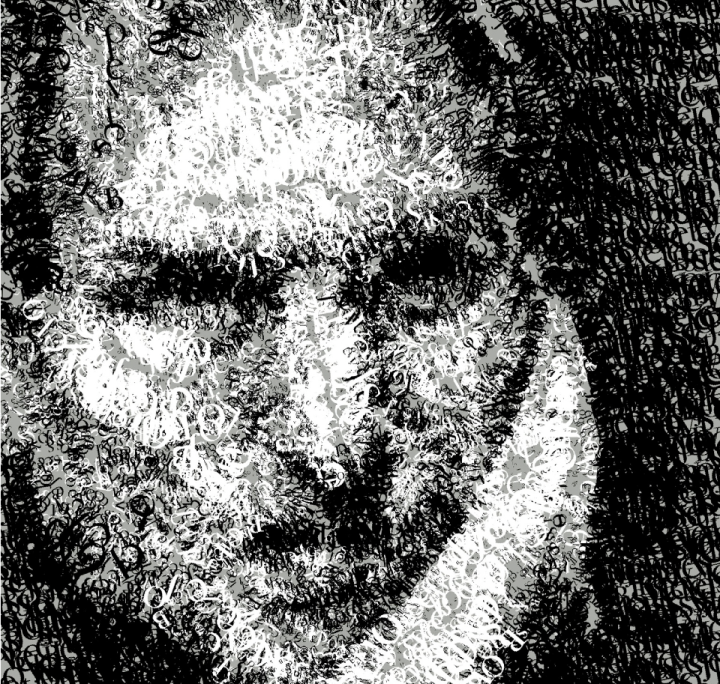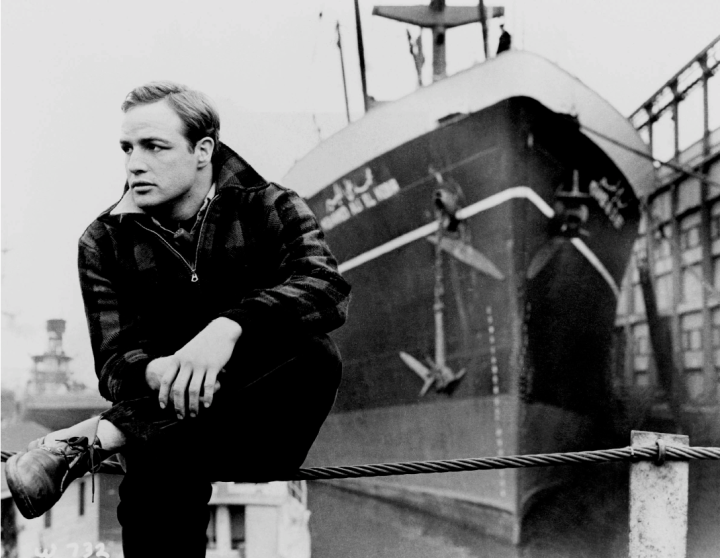Words Maketh

When I realize something, I often look back and see a path connecting things I previously knew so that my realization becomes at once revelatory and obvious. Several neurons in my brain rush to meet each other and then slow as they approach, realize that they have been neighbors all this time and then conclude with a sheepish “wazzup.” Nonetheless, I fantasize that this consistency belies a deeper profound significance and that my unlocking of it has unleashed a universal truth. The trailer for my imagined biography depicts my purchase of a seamless robe and my holding forth on the trading floor of the Chicago Commodity Exchange, converting commodity-traders with every word. That broadcast is soon interrupted by a public service announcement to the effect that I have been such a terrible dolt for so long that a law has been passed prohibiting my consumption of quality meat. I had just such an experience this morning in the bathroom. I was standing in front of the mirror, my mouth open, my eyes staring through themselves. A toothbrush rested on a shy molar and a long stretching minty flavored stalactite of spittle flowed out of my mouth and reached slowly, I would say elegantly, for the exasperated sink-bowl below. Upstairs a number of thoughts were coming together.
In my family, my Grandfather is held in the highest esteem and thoughts of him to this day instantly flood us all with feelings of undiluted love. His profound modesty insured his immortality in our hearts. I think that as a boy I must have been either aware that I was in the presence of a great wisdom or that some day the sun would simply not rise in quite the same way. During one of the magical summers I spent with him I hounded him daily with a single question. That summer I was reading about Alexander the Great and the role of his great teacher Aristotle. I fancied that I was Alexander the Great and so clearly I had need for an Aristotle.
“What advice would you give me that I can keep with me throughout my life?” I asked my Grandfather.
For weeks he avoided answering the question.
“What little do I know of the world that you should ask me for advice about it!” he replied.
But nothing can stop a tenacious child with an endless summer and eventually he spoke.
“I wish I had said less,” he replied.
Not quite getting the tone and suspecting that it was his indirect way of suggesting that I pipe-down I pushed him to assess the sincerity of his suggestion.
“Sometimes I’ve said such stupid things,” he continued, “and I knew once the words had left my mouth, but there was no way of taking them back and if I only had stayed quiet, everyone would have been better off.”
The gaze in his eyes was not fixed in the present. He was in some place before me, perhaps before my father if not before himself. I now felt like my search for Aristotle had cost too much and incapable of bearing a second of anything less than his happiness, I nudged him and tried to make light of the whole thing and said;
“Sometimes we all say things and they are just words, its just talk.”
He was not regretful or sad but the feeling seemed more like a craftsman looking back on something he had made and being a little annoyed by some aspect of it.
“Sometimes its better to say less,” he concluded.
I took this, wrapped it in my own ignorance and placed it inside my heart for a future where perhaps I would understand it better. As the years passed I added to that inheritance something my father told me as I became a young man;
“All it takes for evil to triumph is for good men to stay quiet.”
And something my mother said:
“Never use the word hate.”
These three wisdoms are my inheritance. I often unfold them from their napkins at times when I need either guidance or courage. I have looked at each, sometimes excluding the other. I’ve balanced them, favored some and discounted others, often to serve my own ends. But lately they have become in my mind, like the stars in Orion’s Belt; aligned.
In my first lecture at University, my English Literature professor began:
“The world is made of stories. Stories we tell each other about the world around us and ourselves about that which lies within.”
If this is true, and I increasingly believe that it is vitally so, then words are the building blocks of what we call reality. All three pieces of advice, given to me by my family, center around a belief in the potency of words. In alignment they read;
“Words have power, use them with judgment and justice, otherwise you will create a hell for yourself.”
Neuroscience supports the statement that consistently repeated thoughts create neural pathways in the brain that makes it more likely that subsequent thoughts will follow the same path. But consistently used words can also create consistent thought patterns. Change your words and over time you can change your thoughts. Hateful words preserve hateful thoughts and end with our becoming hateful. Right speech can create right mind and words can maketh the man.
In Camera

For now, it is not important why I am in a wooden crate in a warehouse on the outskirts of Toronto. And you should not let your curiosity fool you into thinking that the series of events that led me to being in this situation is anything other than banal and commonplace. Some of your assumptions you can rely on. This voice is the voice of a fully grown man and not some art-school experiment where you have to appreciate the inner monologue of a mangosteen. You may also rely on the assumption that this event is happening today and that by crate I mean a wooden box of cuboid form of the type in which you might expect to find the Ark of the Covenant. With those three confirmed assumptions and the aforementioned geographic location, everyone will understand how you thought that this was about a curled-up man in a box in Canada. Within that frame, all that matters are my thoughts. It may seem a little brusque to say so, but without wanting to seem any more rude than necessary, let me remind you that there are other boxes.
One of the obvious luxuries of being in a crate is that it affords a perfect theatre in which to enjoy one’s own thoughts. Some people said that cinema was finished once the VCR came out. Now we live in the age of the video and yet cinema thrives. Only mice realize that cinema is a ritual and the screen an inter-ontological elevator of uncertain direction. When four or five people stop in the street to stare at something, say the ever-increasing shadow cast by a suicidal piano, they are soon joined by several more and several more etc. Evolution has schooled us to obtain information as soon as possible, which is why we have rubber necks. Imagine then how that little nubbin deep in our brain reacts to a room of two or three hundred people voluntarily placing themselves in a darkened space, all looking forward, in the same direction, at a single screen. That act is cinema, or mass. In both cases, this ritual tells that primordial nubbin, one single, urgent, undistracted message; God is going to come out of that wall. You see this effect most noticeably in children. With adults it is tempered only slightly by the fact that when it comes to dates, no one can stand you up like God. Hence the crate.
I imagine that all across the United States, in the various technology companies that we have come to think of as secular-Santas, engineers and pre-postal employees in white coats and nipple-rings are trying to develop a single storage solution in which one can keep all of one’s movies, photos, music, and experiences. I already have one of these devices attached to the end of my rubbery neck. It is divided into sections with a common motherboard. The first section contains recordings of everything that I have ever known. A red admiral butterfly caught flapping in a spider-web in the dark wooden corner above my cot as a baby and the sound of that desperate flapping. My first taste of sushi and how the term “raw fish” kept flashing in front of my mind’s eye in the most gag-inducing incarnations of the serif font. Then there is my imagination, part two. It uses a fair amount of the data contained in memory but either augments or synthesizes it to such a degree that it can create images and feelings about things I have never known.
When I am in a wooden crate . . . I should tell you that this is not the first time. (Door-to-door its difficult to find a more economical way to see the world.) When I am in a wooden crate, I spend much of my time imagining because its simply fantastic. Nobody says fantastic anymore because its become too fantastic but for me fantastic will always be fantastic. A whole host of new scenery, sights, sounds, sensations and all filmed superbly, just so, as I would like to be able to do myself; though the time to devote to acquiring that skill has to date eluded me.
Normally at this point I would be naked. Liberally? No . . . urgently. Yes. Applying sun-block in one of either two states of mind; rushing to get it done as fast as possible and consequently missing a spot or, channeling the conscientiousness of a Swiss watch-maker to ensure that I cover those awfully painful spots I previously missed. Its such a pain because its so predictable – down to having to wash your hands because they become so slippery, down to the high likelihood that the molecules in the cheap soap will be too large to get under the film of the cream so that in the end you are just wiping it off on the towel. Guilt, sun-glasses, sandals and out the door. Panic and pants. Relief. I now avoid all that.
Google Software Update is about to be installed. Accept and Install. Loading myplaces.kml. Adding overlays. Toronto. Latitude 43.655830 degrees, Longitude -79.459649, Elevation 101 meters. But in my mind; Lembongan, Bali, Latitude -8.693265, Longitude 115.435745, Elevation 2 meters. Beach. Sometimes, especially when I am alone on a beach, I imagine that I have a personal relationship with the Gods. The Gods are usually Greek, and tall, and on their way to a party at which I will be discussed in passing. I am Achilles and I have been brought to this table of sand and sea, as one does with a hero now and again. Alone on a beach, or in a box, it is easier to imagine one’s own importance. The sea hypnotizes me, swinging the pendulum of the tide back and forth in my ears. Everything melts. Quiet. Warm gentle sun. The Gods are telling me something but I am so out of it. I am lost, drifting in a quiet womb in which time is marked only by the rhythms of my mother’s beating heart. Deus ex machina, ex ante.
leave a comment